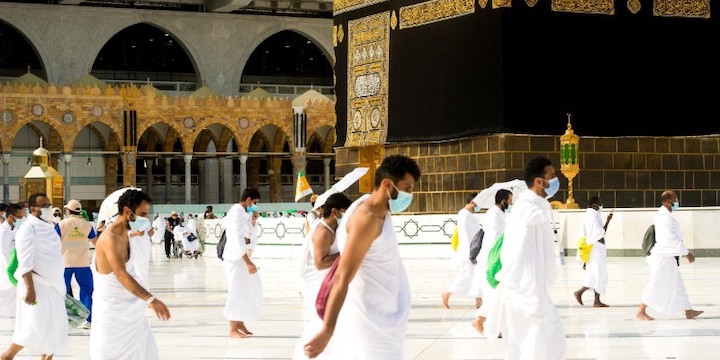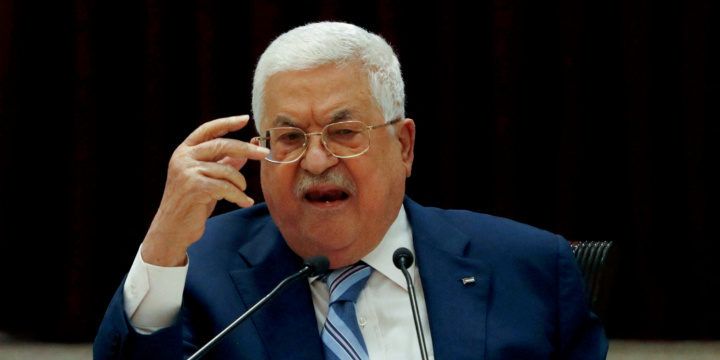Saudi Soft Power Eyes Washington — and Jerusalem
 by James M. Dorsey
by James M. Dorsey

Muslim pilgrims wearing face masks and keeping social distance perform Tawaf around Kaaba during the annual Haj pilgrimage amid the coronavirus disease (COVID-19) pandemic, in the holy city of Mecca, Saudi Arabia July 31, 2020. Photo: Saudi Press Agency/Handout via REUTERS
Geopolitics is written all over Saudi Arabia’s religious soft power efforts. Nowhere is this true more than when it comes to Israel and Jews, because of the growing importance of security cooperation with the Jewish state and the support for Israel in the United States, the kingdom’s most important yet problematic security partner.
In the latest move, Saudi Arabia ensured that it would be the first stop on the first overseas trip by Deborah Lipstadt as the US special envoy to combat antisemitism.
“Lipstadt intends to build on the profoundly important Abraham Accords to advance religious tolerance, improve relations in the region, and counter misunderstanding and distrust,” the State Department said in a statement.
Lipstadt said that Saudi religious soft power diplomacy had created an atmosphere in which she could discuss with government officials and civil society leaders, “normalising the vision of the Jews and understanding of Jewish history for their population, particularly their younger population.”
Saudi Arabia has had a particularly troubled attitude towards Jews in the past. Moreover, in the days when Israelis were barred from traveling to most Arab countries, Saudi Arabia also tailored its visa requirements to bar Jews.
That began to change long before the rise of Saudi Crown Prince Mohammed bin Salman (MBS), who has accelerated a policy change. Earlier this month, Saudi Arabia announced that Israeli business people would be granted entry into the kingdom.
Saudi Arabia has also allowed Jacob Yisrael Herzog, a US-born rabbi resident in Israel, to visit the kingdom several times in an attempt to build Jewish life publicly. Some Jewish critics have charged that his bombastic approach could backfire.
Moreover, in a slow two-decade-long, tedious process, Saudi Arabia has made significant progress in scrubbing its school textbooks of antisemitic and other discriminatory and supremacist content.
To project Saudi Arabia as a moderate forward-looking nation, and improve the kingdom’s tarnished image, MBS has met with American Jewish leaders. Many of those leaders are willing to give Saudi Arabia a pass on its abuse of human rights and still weak track record on religious tolerance, in order to advance the cause of the establishment of diplomatic relations between Saudi Arabia and Israel.
The Crown Prince has also turned the Muslim World League, once a prime vehicle for the Saudi government funding of Sunni Muslim ultra-conservatism globally, into a public relations tool for propagating Saudi religious tolerance. The league’s head, Mohammed al-Issa, a former Saudi justice minister, led a delegation of Muslim religious leaders on a ground-breaking visit in January 2020 to Auschwitz, one of Nazi Germany’s foremost extermination camps for Jews.
Earlier this month, MBS organized a Forum on Common Values among Religious Followers in Riyadh. Participants included 47 Muslim scholars, 24 Christian leaders, 12 rabbis, and seven Hindu and Buddhist figures.
The timing of Lipstadt’s visit is significant. It comes weeks before an expected pilgrimage to Riyadh by President Joe Biden to tackle strains in the strategic relationship between the two countries.
Tensions have emerged over the degree and reliability of the US commitment to Gulf security, Saudi oil production policy in the wake of US and European sanctions against Russia for invading Ukraine, Saudi technological cooperation with China, and Biden’s belief that MBS was responsible for the 2018 killing of journalist Jamal Khashoggi.
Moreover, the visits of Biden and Lipstadt come as hopes are fading that talks in Vienna between world powers and Iran will succeed in reviving the 2015 international agreement that curbed Iran’s nuclear program.
At the sharp end of confronting Iran, Israel unveiled its newly adopted Octopus Doctrine this month. The doctrine expands Israel’s aiming at Iran’s nuclear, missile and drone programs by increasingly attacking targets in Iran rather than primarily on battlefields like Syria.
Saudi Arabia has signaled for some time that it would like to formalize its expanding informal relations with Israel, but needs a cover to do so. Future weeks will see how relations continue to unfold.
Dr. James M. Dorsey is an award-winning journalist and scholar, a Senior Fellow at the National University of Singapore’s Middle East Institute and Adjunct Senior Fellow at Nanyang Technological University’s S. Rajaratnam School of International Studies, and the author of the syndicated column and blog, The Turbulent World of Middle East Soccer.
 Abbas Threatens Ties with U.S. After UN Membership Bid Veto
Abbas Threatens Ties with U.S. After UN Membership Bid Veto US House to Vote on Long-Awaited $95 Billion Ukraine, Israel Aid Package
US House to Vote on Long-Awaited $95 Billion Ukraine, Israel Aid Package Amid Increased Pressure, Hamas Leadership Reportedly Mulls Leaving Qatar
Amid Increased Pressure, Hamas Leadership Reportedly Mulls Leaving Qatar Police Stop Anti-Zionist Agitators From Accessing Florida University President’s Home as Students Revolt Nationwide
Police Stop Anti-Zionist Agitators From Accessing Florida University President’s Home as Students Revolt Nationwide Nearly One in Five Young People Sympathize With Hamas, 29% Say US Should Reduce or End Alliance With Israel: Poll
Nearly One in Five Young People Sympathize With Hamas, 29% Say US Should Reduce or End Alliance With Israel: Poll Ilhan Omar Silent After Daughter’s Arrest, Suspension for Role in Columbia University Anti-Israel Protest
Ilhan Omar Silent After Daughter’s Arrest, Suspension for Role in Columbia University Anti-Israel Protest Cultural Center Backed by Iran’s Revolutionary Guard Plans to Produce Films About Attack on Israel
Cultural Center Backed by Iran’s Revolutionary Guard Plans to Produce Films About Attack on Israel How Does Ilhan Omar Really Feel About Iran?
How Does Ilhan Omar Really Feel About Iran? This Passover, Combine Respect for Tradition with the Courage to Innovate
This Passover, Combine Respect for Tradition with the Courage to Innovate Israel’s Iran Attack Carefully Calibrated After Internal Splits, US Pressure
Israel’s Iran Attack Carefully Calibrated After Internal Splits, US Pressure



 Police Stop Anti-Zionist Agitators From Accessing Florida University President’s Home as Students Revolt Nationwide
Police Stop Anti-Zionist Agitators From Accessing Florida University President’s Home as Students Revolt Nationwide Amid Increased Pressure, Hamas Leadership Reportedly Mulls Leaving Qatar
Amid Increased Pressure, Hamas Leadership Reportedly Mulls Leaving Qatar US House to Vote on Long-Awaited $95 Billion Ukraine, Israel Aid Package
US House to Vote on Long-Awaited $95 Billion Ukraine, Israel Aid Package Abbas Threatens Ties with U.S. After UN Membership Bid Veto
Abbas Threatens Ties with U.S. After UN Membership Bid Veto Cultural Center Backed by Iran’s Revolutionary Guard Plans to Produce Films About Attack on Israel
Cultural Center Backed by Iran’s Revolutionary Guard Plans to Produce Films About Attack on Israel